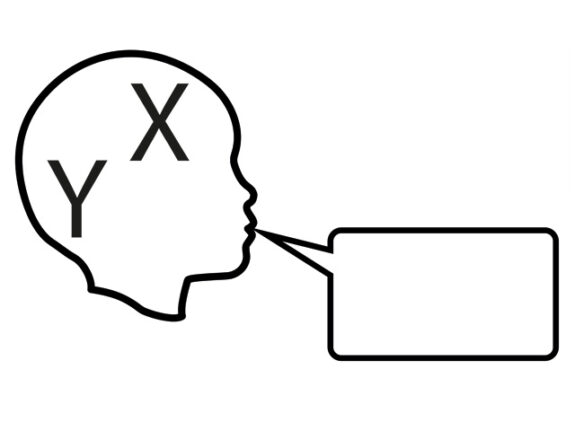
Plain English
Everything as simple as possible in speech and language therapy, but no simpler
Many terms in linguistics are used in highly specialised ways. Like physics and other sciences, linguistics has its own particular points of focus. The various specialisms in the area each have technical preferences. Clinical linguistics is no exception. Here I try to keep my use of technical terms to a minimum, using words in the most familiar senses as far as possible, explaining things as and when necessary
The term, ‘language’, is used in many senses, one referring to literacy or the use of the written word. Language is not used in this sense here, but in a more informal sense referring to the way words are put together, known as ‘syntax‘, to the way words are formed, known as ‘morphology‘, to the way language is used, known as ‘pragmatics‘, to the way meanings are assigned, known as ‘semantics‘. For the sake of simplicity, I use the term ‘speech’ to refer to the organisation of the sound system, known as ‘phonology‘, to the formation of the sounds, known as ‘phonetics‘, and to the way sounds are put together in syllables as ‘phonotactics‘. to cover what are known as phonetics, phonology and phonotactics and ‘language’ to cover syntax, morphology, and sometimes pragmatics. I try to do this unless I am talking about just one of these areas. I hope it is clear what is meant in each case. I use the term ‘grammar’ to cover all of these areas, in other words uncommonly generally, to refer to those areas where there are general principles that have to be learnt. The architecture defines the relations between these areas – in a way crucial for acquisition. Metalinguistics is the awareness of linguistic structure. It has no plain English equivalent. It is often a significant co-morbidity issue.
Two of these areas are semantics and the lexicon or vocabulary. I treat these as areas on their own. Literature, poetry and prose, once considered the main reason for any interest in language, plainly do not involve science in the modern sense. But the narrative of stories, the rhythm of poetry, and even the logic of creating them, all enter speech and language therapy.
Rather than phonetics, found by many to be an impenetrable barrier, I use the much less precise device of capital letters to represent speech sounds and their often quite variable pronunciations.
I just thumbnail some of these various areas of linguistics in Ax, ex, ics and ologies. and some diagnostic terms in Speech and language therapy. The water is murky. For instance, the separateness of morphology from syntax is disputed in both directions. I set such territorial issues aside.
Dialect and accent
Two particularly problematic terms are dialect and accent.
It is often suggested that where there are differences in the words themselves or the order of them, these differences should be treated as matters of dialect, and that where the differences are in the pronunciation of words, these should be treated as matters of accent. But this is over-simplifies the issues.
In 1917, the phonetician, Daniel Jones, coined the term ‘Received pronunciation’ for what he quaintly called “the speech of men educated at one of the great public schools of England.” What he thought of women’s speech or the speech of men educated anywhere else, such as members of the royal family at the time who were then taught privately at home, he does not say. But the intention behind what is now mainly called RP is clear. It is the speech of privilege and inherited wealth in Britain. RP is sometimes characterised as an ‘accent’ of English, a particular way of pronouncing it. But this falsely assumes that there are no associated particularities in the grammar or the lexicon.
RP changes over time. Sydney Harbour Bridge was formally opened in 1932. The commentary was voiced in the RP of the time, now sounding quaintly archaic. In 1933 Herbert Ponting, the photographer on Scott’s last, fateful voyage, voiced his own commentary to the film in the same ancient RP. Ivor Montagu, the first and original visionary of table tennis, who died in 1984, was one of the last speakers. But this version of RP is no longer spoken.
For me, as a native speaker of RP, “How many are we for dinner?” is perfectly acceptable, grammatical, interpretable, but for many British English speakers it is highly questionable. Numerous other examples can easily be found.
The characterisation of RP as an accent coyly hides the sociology.
Deliberately dodging the various issues here, because they are not relevant to my main purpose, here I just speak of VARIETIES of the language.
History and data
Much of linguistic philosophy and terminology is from Ancient India, Greece and Rome, possibly one Etruscan insight, but with a massive updating over the past 500 years, including the pathbreaking scholarship of William Holder, in 1669, William Jones in 1788, Jacob Grimm, otherwise known as the collector of fairy tales, in 1822, Noam Chomsky and Morris Halle in SPE in 1968, and many more. In other words the intellectual tradition is far older than sociology or psychology – to name two areas of inquiry which are sometimes taken to call into question traditional and modern methodologies of linguistic research.
Both sociology and psychology lay great stress on the methodology of data acquisition. In a way which seems almost contemptible from sociological and psychological perspectives, linguists working in the framework assumed here have not found any reliable alternative to the most informal methods of data acquisition – introspection. This seems to work fine for the clear cases – like the contrast between ‘Something good’ and ‘Good food’, as meaningful English expressions, and ‘Good something’ and ‘Food good’ which most speakers find almost uninterpretable. But there is an obvious problem with the less clear cases.
This approach is strongly opposed by some of those proposing various alternatives to the model assumed here.

